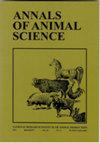饲粮中添加s -甲基蛋氨酸磺酸对尼罗褐虾生长、血清生化指标、体成分及相关基因表达的影响
IF 2.2
4区 农林科学
Q2 AGRICULTURE, DAIRY & ANIMAL SCIENCE
引用次数: 0
摘要
摘要本试验旨在研究罗非鱼饲料中添加s -甲基蛋氨酸磺酸氯(MMSC)对尼罗罗非鱼(Oreochromis niloticus)生长性能、饲料效率、体分析、血液生化以及肌肉生长抑制素(MSTN)和胰岛素样生长因子-1 (IGF-1)基因调控的影响。将体重为22.4±0.17 g的试验鱼(n =180)随机分为3组,每组3个重复,如下所示;对照组饲喂无补充饮食;另外两组给予两种不同水平的MMSC(0.2和0.4 g/kg),持续8周。结果表明,与对照组相比,添加小剂量MMSC的罗非鱼饲料显著(P<0.05)提高了罗非鱼的生长性能和饲料效率指标。与对照组相比,在罗非鱼饲料中添加0.2 g MMSC显著(P<0.05或0.01)提高了罗非鱼的血液蛋白谱,尤其是总蛋白和球蛋白水平。与未添加MMSC组相比,添加MMSC(0.2或0.4 g/kg)组罗非鱼的血肌酐水平显著(P<0.01)降低。而鱼体分析显示,与其他处理组和对照组相比,低剂量MMSC组的粗蛋白质和粗脂肪水平显著升高(P<0.01),灰分含量显著降低(P<0.05)。此外,与对照组相比,饲粮中添加MMSC可显著下调MSTN表达,上调IGF-1 mRNA表达。此外,与对照组相比,两种剂量的MMSC补充都适度增强了肠绒毛组织形态学评分指数,观察到高、厚和各种宽尖端。综上所述,每kg饲料中添加0.2 g MMSC可促进尼罗罗非鱼的生长和整体健康状况。本文章由计算机程序翻译,如有差异,请以英文原文为准。
Dietary effect of S-Methylmethionine sulfonium chloride on growth, serum biochemical parameters, body composition, and expression of some related gene in Oreochromis niloticus
Abstract The main objective of the current trial was to investigate the impacts of supplemented tilapia diets with S-methylmethionine sulfonium chloride (MMSC) on the growth performance, feed efficiency, body analysis, blood biochemistry and regulation of myostatin (MSTN) and insulin-like growth factor-1 (IGF-1) genes of Nile Tilapia (Oreochromis niloticus). The experimental fish (n =180) weighing 22.4±0.17 g were allocated randomly into three equal groups in triplicate as follows; the control group received an un-supplemented diet; the other two groups received two different levels of MMSC (0.2 and 0.4 g/kg) for eight weeks. The obtained findings demonstrated that tilapia diets enriched with small dosages of MMSC considerably (P<0.05) enhanced all assessed growth performance and feed efficiency indicators when compared with the control group. When compared to the control group, supplemented tilapia meals with 0.2 g MMSC significantly (P<0.05 or 0.01) raised blood protein profile, particularly total protein and globulin levels. Contrarily, blood creatinine levels were significantly (P<0.01) reduced in the group of tilapia fed diets containing MMSC (0.2 or 0.4 g/kg) compared to the group without receiving any supplementation. Whereas, fish body analysis showed higher significant increases in crude protein and ether extract levels (P<0.01) as well as reduced ash content (P<0.05) in the fish group that received lower MMSC doses in comparison to other treated and control groups. In addition, MMSC dietary supplementation significantly down-regulates the expression of MSTN and upregulates IGF-1 mRNA expression compared with the control group. Additionally, both dosages of MMSC supplementation modestly enhanced the intestinal villus histomorphometric score indices with observed tall, thick, and various broad tips in comparison to the control group. In conclusion, it could be recommended that supplemented fish diets with 0.2 g MMSC per kg diet may promote the growth and general health status of Nile Tilapia.
求助全文
通过发布文献求助,成功后即可免费获取论文全文。
去求助
来源期刊

Annals of Animal Science
农林科学-奶制品与动物科学
CiteScore
4.00
自引率
5.30%
发文量
138
审稿时长
6-12 weeks
期刊介绍:
Annals of Animal Science accepts original papers and reviews from the different topics of animal science: genetic and farm animal breeding, the biology, physiology and reproduction of animals, animal nutrition and feedstuffs, environment, hygiene and animal production technology, quality of animal origin products, economics and the organization of animal production.
 求助内容:
求助内容: 应助结果提醒方式:
应助结果提醒方式:


